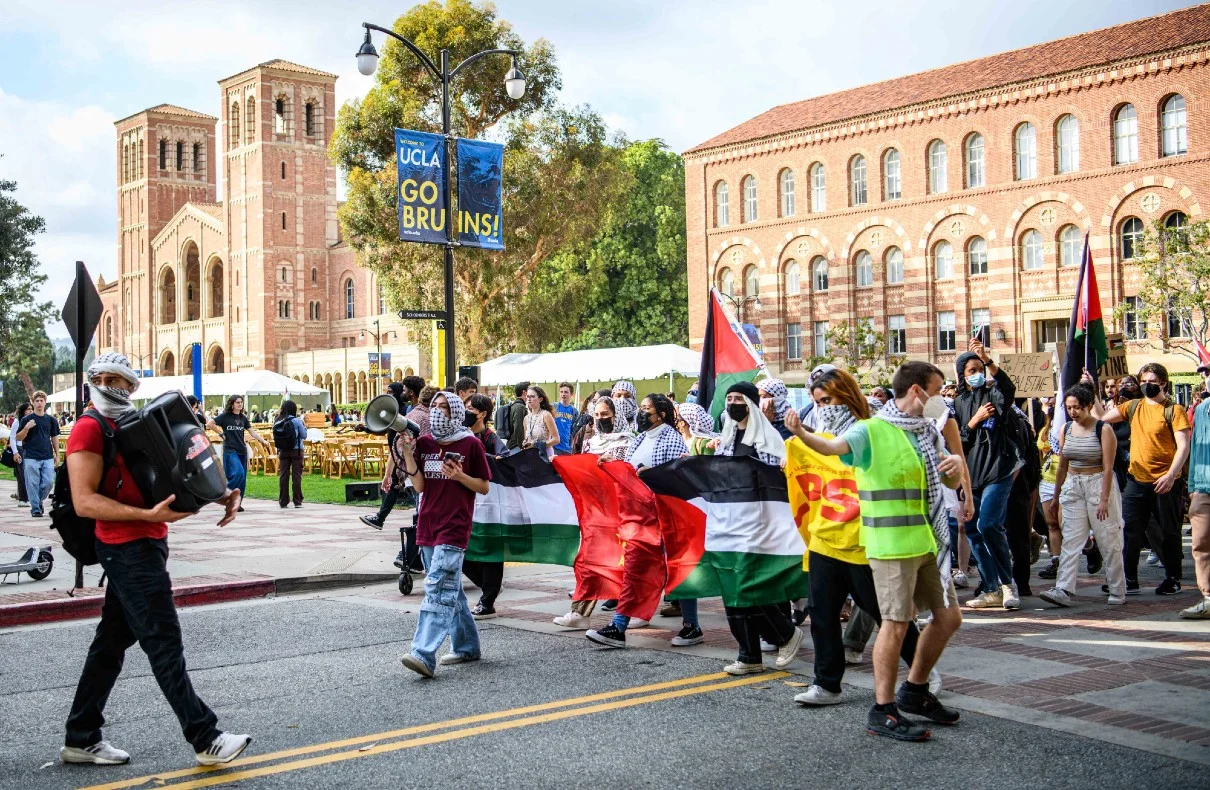Tensions have escalated at the University of California, Los Angeles (UCLA) as pro-Palestinian protesters set up an encampment on campus, sparking clashes with pro-Israel supporters and prompting a forceful response from university authorities. The protest, organized by the Students for Justice in Palestine at UCLA (SJP-UCLA), has drawn attention to the ongoing Israeli-Palestinian conflict and reignited debates about free speech and the role of universities in addressing political issues.
The protesters, who have vowed not to leave until their demands are met, have established a makeshift camp in the heart of the UCLA campus. According to a statement released by the SJP-UCLA, the encampment is a symbolic act of solidarity with the Palestinian people and a call for the university to take a stronger stance against Israeli policies.
“We will not leave. We will remain here until our demands are met,” the group declared, outlining a series of requests that include:
- The university’s divestment from companies and organizations that support or contribute to the Israeli occupation of Palestinian territories.
- The adoption of a formal policy condemning the actions of the Israeli government and its treatment of Palestinians.
- The establishment of a Palestinian Studies program within the university’s curriculum.
As the encampment gained momentum, it drew the attention of pro-Israel supporters on campus, leading to heated confrontations and physical altercations. Videos circulating on social media depict scenes of chaos, with protesters from both sides engaging in verbal and physical exchanges.
In response to the escalating tensions, UCLA Chancellor Gene Block released a statement condemning the violence and expressing concern over the “abhorrent incidents” that have “damaged our community’s sense of security.”
“However one feels about the encampment, this attack on our students, faculty, and community members was utterly unacceptable,” Block said, referring to reports of injuries sustained by protesters during the clashes.
As the situation spiraled out of control, law enforcement authorities were called in to restore order on the UCLA campus. Images and footage show officers from the California Highway Patrol (CHP) attempting to clear the area near the encampment, with some protesters resisting their efforts.
Chancellor Block has promised a thorough investigation into the incidents, warning that those found responsible could face “arrests, expulsions, and dismissals.” He described the events as a “dark chapter” in UCLA’s history and vowed to take necessary steps to ensure the safety and well-being of the university community.
To sustain their ongoing protest and encampment, the SJP-UCLA has circulated a list of requested items and supplies among supporters. The list, which has been shared widely on social media, includes a range of items, from food and medical supplies to protective gear and construction materials.
Among the notable items requested are:
- Vegan and gluten-free food options, with specific requests for items like bananas and coffee, but a ban on nuts and packaged foods.
- Protective gear, such as airsoft goggles, knee and elbow pads, utility gloves, and skater helmets.
- Construction materials, including rope, zip ties, wood for barriers, and shields.
- Medical supplies, including non-steroid inhalers, EpiPens, and Aquaphor ointment (but not sunscreen).
The group has also emphasized the importance of adhering to the principles of the Boycott, Divestment, and Sanctions (BDS) movement, which advocates for boycotts and economic sanctions against Israel.
The pro-Palestinian protest and the subsequent clashes have drawn sharp criticism from pro-Israel groups and organizations. Stop Antisemitism, a nonprofit dedicated to combating antisemitism, questioned the protesters’ commitment to the BDS movement, asking “Did they all throw out their iPhones to meet BDS compliance?”
Other pro-Israel organizations have accused the protesters of promoting antisemitism and have called on UCLA to take stronger action to protect Jewish students and faculty on campus.
The events at UCLA have reignited debates about the boundaries of free speech on college campuses and the role of universities in addressing political and social issues. While some argue that universities should remain neutral and avoid taking sides in contentious debates, others believe that institutions of higher education have a responsibility to promote social justice and human rights.
Supporters of the pro-Palestinian protest argue that their actions are a legitimate exercise of free speech and that universities should support their right to peaceful protest and expression. Critics, however, contend that the encampment and the associated demands cross a line and create an environment that is hostile and intimidating for certain groups on campus.
The UCLA protest has garnered national and international attention, with various political and advocacy groups weighing in on the issue. Some have praised the protesters for bringing attention to the plight of Palestinians, while others have condemned the tactics employed and the disruption caused on campus.
As the situation continues to unfold, it remains to be seen how UCLA and other universities will respond to similar protests and whether the events at UCLA will set a precedent for how such situations are handled in the future.
Amidst the tensions and divisions, calls for dialogue and reconciliation have emerged from various corners of the UCLA community. Student leaders, faculty members, and administrators have urged all parties involved to engage in respectful and constructive conversations, seeking common ground and understanding.
“We must find a way to address these complex issues in a manner that upholds our shared values of freedom of expression, mutual respect, and the pursuit of knowledge,” stated a joint statement issued by several student organizations.
